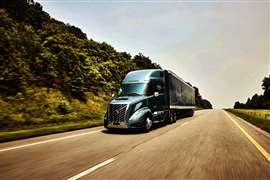Read this article in French German Italian Portuguese Spanish
Global Roads: The benefit of lower emissions
16 July 2025
Our correspondent says there is nothing to be gained by ignoring the positives of lower emissions.
 The all-new Volvo VNL 860 was on show at ACT Expo. (Photo: Volvo Trucks North America)
The all-new Volvo VNL 860 was on show at ACT Expo. (Photo: Volvo Trucks North America)
Cast your mind back to Hanover eight months ago and the biannual IAA Transportation event. Considered — not unreasonably in terms of size and footfall — as the premier global trucking industry trade event, attendees at IAA 2024 left with much to talk about, including the decision by Volvo to focus its entire show offering on electric vehicles.
Fast forward to Anaheim, California, eight months later, and the ACT Expo. Considered — again not unreasonably — as the premier event for zero-emissions road transport in the United States. On the Volvo booth, significant space was given over to the latest iteration of the Class 8 VNL tractor. Nothing odd here, until you note the absence of battery packs and the presence of a diesel fuel tank.
Volvo was not alone in showcasing diesel-powered products at this year’s ACT Expo. As a whole, the industry, currently dealing with regulatory opacity and the cost/impact of tariffs, appears to have taken a step back when it comes to zero-emission vehicles.
Paul Rosa, SVP of Market Procurement and Fleet Planning at Penske, summed up the change in attitude, saying: “It’s a very interesting time that we’re in. Now I think there’s going to be opportunity for both sides of that equation, for both rails — zero-emission vehicles and traditional [internal combustion engines] — to continue to evolve to meet the goals that we’re trying to accomplish with reducing the carbon footprint.”
The Good and Bad
This reset is welcome news. Much of the zero-emission debate has been framed in terms of absolutes, where a vehicle is either zero emission (Good) or not zero emission (Bad). This is a somewhat naive approach (though sadly it’s the one much favored by regulators) that fails to recognize the value of lowered emissions as a waypoint on the decarbonization journey.
 Oliver Dixon is an industry analyst based both in the U.S. and the EU for Global Highways, which covers the commercial vehicle industry worldwide. Email: [email protected]
Oliver Dixon is an industry analyst based both in the U.S. and the EU for Global Highways, which covers the commercial vehicle industry worldwide. Email: [email protected]
To use an already overused example, it would take around 42 present-day Class 8 trucks to emit the same amount of pollutants as just one vehicle from 40 years ago. This is clear, obvious, and very welcome progress, but when viewed through the ‘Zero or Nothing’ prism, it suggests failure. This is nonsense.
Attempts to force decarbonization through regulation have not been successful. Some ESG-minded fleets have begun to dip their toes in the electrification pool, but adoption remains scant. Of greater concern are the longer replacement cycles in some market sectors, which will lead to older, less efficient vehicles operating beyond their optimal duty life.
No one operates a trucking fleet for fun. It is a business, one that is bound by considerations of profit and loss. However, from a broader perspective, trucking is a fundamental necessity; it lies at the core of economic activity, and that which imperils the industry does not benefit the rest of us much, either.
So this restoration of pragmatism should be welcomed. No one doubts the impact of vehicle emissions on the environment, but so too should no one doubt the contribution made to the broader economy by those vehicles. Call it an opportunity cost if you will, but a non-agrarian economy demands a transportation system that is fit for purpose.
Emissions are an opportunity cost — certainly — but they are also a cost which has been declining for years and will continue to do so.
Editor’s Note: this article originally appeared in the April-June 2025 issue of Power Progress International.
POWER SOURCING GUIDE
The trusted reference and buyer’s guide for 83 years
The original “desktop search engine,” guiding nearly 10,000 users in more than 90 countries it is the primary reference for specifications and details on all the components that go into engine systems.
Visit Now
STAY CONNECTED




Receive the information you need when you need it through our world-leading magazines, newsletters and daily briefings.
CONNECT WITH THE TEAM









